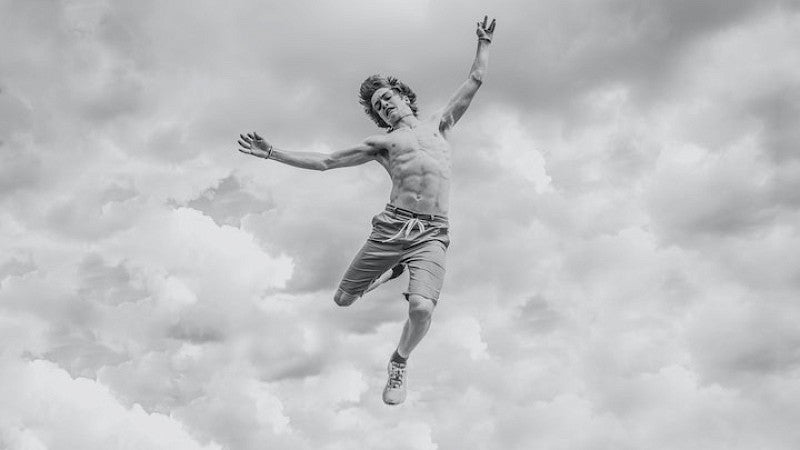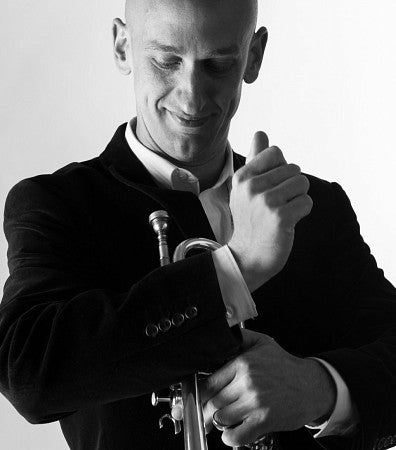
photo by Shane Rouce/Unsplash
Story by Claire Warner, CHC Communications
Associate Professor Brian McWhorter just wants his students to rock out.
When developing the class, "The Velocity of Gesture, or Intro to Air Guitar," for winter term last year, McWhorter had a radical idea — to give students dedicated time to explore how they express themselves. One of the first tasks he assigned his students was to perform an air guitar solo.
“We all know that we do it when we’re by ourselves. No one’s kidding anybody here. When we’re left home alone, our roommates or family aren’t home, we occasionally will rock out,” McWhorter said. “The question is, how do we feel when we do that? Do you feel more like yourself or do you feel like you’re putting on some sort of performance?”
While it’s not uncommon for an adult to say, “I wish I had that class in college,” the academic goal of the course is for students to learn how gesture contributes to the human experience. McWhorter said his personal goal is for students to explore their bodies and body language, which “feels pretty radical in an academic space.” He accomplished this last winter when he first taught the class through assigned readings, essays, and performances.
The class had five performative exercises throughout the term, which were “hilarious and so moving,” McWhorter said. “There were so many classes that I was just crying, either out of just laughing so hard or I was just so moved.”
One of the more popular performances was the air guitar solo, in which students played air guitar to a song of their choice. McWhorter said students were to use body language to embody what they were hearing and “to identify with the solo as if it was part of them.”

CHC's Brian McWhorter
McWhorter’s initial interest in gesture studies began when he started conducting Orchestra Next. He describes conductors as “musical gesture artists,” whose body language dictates the sound of music. He explained that if he conducted the opening of the Nutcracker Suite— a happy and skippy tune — in a grumpy mood, then his body language would carry that emotion into the piece and the music would sound grumpy.
“We are tasked, in the performing arts, with becoming characters and embodying those characters,” McWhorter said. As a result, “we have far more options with how we process the world.”
McWhorter said that there are rarely any similarities in how famous conductors move with music, despite leading some of the greatest orchestras in the world.
“They could be doing the same piece but they’re moving wildly different,” McWhorter said. “If you see somebody that’s conducting and they have the music in them, it doesn’t matter how they’re moving. It’s going to reflect the music.”
Besides the relationship between music and gesture, McWhorter sees writing as having gesture as well, describing Academese — the language of the academy — as stiff, pretentious and attempts to assert authority.
“If we were to take those descriptions and we were to adopt a body language that fits those descriptions, I think we know what we would see,” McWhorter said. “To me, writing and gesture, thought and gesture, music and gesture — they’re all more closely associated than we might think.”
He believes that writing in different ways encourages different kinds of thinking. For this reason, McWhorter challenged his students to submit unconventional papers for their essay assignments. They submitted comic books, visual art and poetry. Although some students stuck with Academese, McWhorter hoped they could include their own voice into whatever writing style they chose.
Because the class urged students to explore modes of expression, McWhorter said he remembers all the students in his past "Intro to Air Guitar" classes.
“I remember all of their personalities so strongly,” he said. “It was like a window into who they are which made them really memorable to me.”
One of the students, Ethan Scott, said the class was “by far the most unique class I’ve ever taken.” For the final performance, Scott chose to sing and dance in front of the class, “which is something I never do,” he said.
“The most important aspect of this class to me was the fact that it gave me the ability to push myself out of my comfort zone and discover new things and new passions,” Scott said.
McWhorter will be teaching the class again this winter, in which he anticipates most of the same assignments, but performances will likely be recorded instead of live. He will also host guest lectures with professors of philosophy, linguistics, and dance.
Overall, he is hopeful that the class will afford students the space to learn something new about themselves.
“I don’t think there was anybody in the class that felt like it didn’t change something about how they were conceiving about the topic or themselves,” he said. “The subject of the class is less about gesture, less about performance. It’s really about themselves.”
